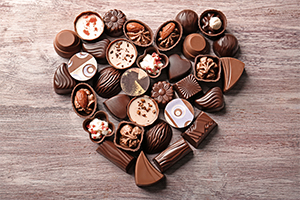News
The Power of Chocolate
Date: 02/01/23

When you think of Valentine’s Day, what comes to mind? A dozen deep red roses? A candlelight dinner? Or a beautiful satin-wrapped box of chocolates? If you thought of the chocolate, you’re not alone. Valentine’s Day is the third largest season for chocolate sales in the U.S,[1] with candy (including chocolate) making up as much as 56% of all Valentine’s Day gifts given.[2] Chocolate is a product with a long and interesting history, and it may even have health benefits! Even if you don’t celebrate Valentine’s Day, it might be worth picking up a little treat for yourself or someone special.
About Chocolate
Chocolate is made from the fruit of cacao trees. Scientists and historians think that people in Central America and Southern Mexico have been consuming products made from cacao for 2-3,000 years. The Olmecs most likely used it as a ceremonial drink. The Maya and Aztecs followed their lead. They felt that chocolate was a gift from the gods and drank a frothy, bitter blend of cacao mixed with water, chili, and sometimes honey.[3] In fact, chocolate remained a beverage long after the Spanish conquistadors took it back to Europe. There, the mixture changed to adapt to European taste, with the addition of sugar, cinnamon, and other spices. It was fashionable and expensive, and wealthy people drank hot chocolate in “chocolate houses.”3
In the 1800s, a Dutch chemist invented “Dutch process” cocoa by removing some of the cocoa butter, leaving behind a fine powder. This made hot chocolate more affordable and accessible for everyone. Then, in 1847, a British chocolatier made the first chocolate bar. Through the rest of the 1800s, the founders of the companies that would be Nestlé and Lindt improved the process with the addition of milk powder (to create milk chocolate) and air (to make it smoother and creamier).3 And so, what we would recognize as eating chocolate came to be. Today, the United States accounts for 20% of the world’s chocolate consumption, with the average American eating around 12 pounds of chocolate a year.[4]
Chocolate and health
Some studies suggest that cocoa may have health benefits, possibly improving heart and brain health. Researchers think this is because cocoa is rich in flavanols. These compounds, which give cocoa its bitter taste, also have antioxidant and anti-inflammatory properties, which could have health benefits. The darker the chocolate, the higher the concentration of flavanols, and in theory the more antioxidants it has. Some physical and mental health benefits of chocolate may include:[5] [6]
- Lower blood pressure. Flavanols stimulate the body to produce nitric oxide in the blood, which helps open up blood vessels and allows blood to flow more freely.
- Boosts “good cholesterol”. Cocoa contains chemicals called polyphenols, which are believed to block the absorption of cholesterol and may improve “good” cholesterol levels.
- Keeps your heart healthy. All these effects on blood pressure and cholesterol can reduce the risk of heart disease and stroke.
- Makes you feel good. Eating chocolate releases serotonin and endorphins – feel-good hormones in the brain.
- Improves brain health. The anti-inflammatory and antioxidant properties of flavanols was shown to improve brain blood flow, oxygen levels and nerve function.
- Improves cognitive function. Studies suggest that people who regularly eat chocolate may have less memory decline. Seniors in one study who ate chocolate had better performance on tests of their ability to learn and problem solve than those who didn’t.
If you indulge
Chocolate may have health benefits, but it’s important to remember that it’s a treat best eaten in moderation. Because pure cocoa is very bitter, producers add sugar and fat to make it appeal to our taste buds. Eat small amounts of the darkest chocolate you can – and watch your total calorie intake. Gaining weight will wipe out any benefits you might get from the compounds in chocolate. Happy Valentine’s Day!
[1] Valentine's Day the Third Biggest Holiday for Chocolate Candy Sales, reports Packaged Facts (prnewswire.com)
[2] That Valentine's Day Flowers, Jewelry and Chocolate to Cost $23.9 Billion - TheStreet
[3] History of Chocolate: Cocoa Beans & Xocolatl - HISTORY - HISTORY
[4] 27 Incredible Chocolate Consumption Statistics - BrandonGaille.com
[5] Chocolate: Health benefits, facts, and research (medicalnewstoday.com)
[6] 10 reasons why chocolate is good for you | BBC Science Focus Magazine
.jpg)
